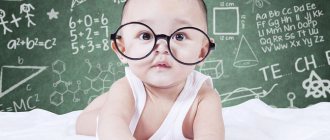Giftedness
Scholars have not established a universally accepted term that is used in all classical educational books. Scientific books use the option proposed by psychologist V. Stern.
Giftedness is a person’s ability to adapt to emerging needs, to act to achieve goals, perceiving external factors, and this is done consciously with the help of developed thinking.
Despite criticism of the concept by some scientists, the term is still used for interpretation. It is generally accepted that this ability is a natural gift that cannot be determined by heredity. Giftedness is a function of a person’s living conditions, a function of a developed personality, therefore it manifests itself at every stage of development and is directly related to the life of an individual.
Natural potential cannot be determined by a person’s talent. Inclinations make up the spectrum of conditions that are required for personality development. Giftedness is used not to express internal inclinations for self-improvement, but to characterize a person, internal abilities, and internal abilities and external manifestations are closely related.
The manifestation of the inherent potential is possible under favorable conditions for development and achievement of assigned tasks. It is used to express the potential that a person has, the psychological components that allow him to create a reality that corresponds to his wishes and take the necessary actions. Suitable external conditions for dynamic change are imperative. For example, a student needs a curriculum. Stimulating development requires serious demands that are achieved with effort.
Giftedness can be special. In this case, the relationship between internal potential, mental characteristics and the requirements of a certain sphere that the individual chooses is considered. The correlation manifests itself not only at the abstract level, but also in ongoing events, as a result of which a person’s abilities are formed. The individual may be capable of completing assigned tasks. At the same time, the manifestation of general talent is assumed, which must be assessed taking into account external factors influencing a person’s life.
In the scientific literature, the term causes active debate. Many scientists are convinced of the absence of general talent, which must be understood as intellectual potential, memory, and the ability to solve assigned problems. To compare mental and real age, an intellectual quotient is used, which is designated IQ and allows you to determine the capabilities of an individual. IQ determines the potential inherent in nature and the speed at which a person develops, as a result of which the level of development at a certain stage of life is established.
In the psychological sphere, giftedness is part of the human structure, so it has a close connection with character. It is assumed that characteristics manifest themselves under the influence of upbringing and external conditions, the favorability of which varies. Psychologists look at the type of thinking and temperament, trying to determine the capabilities of individuals.
Special abilities directly depend on the field of activity in which a person is involved. The activity must be active and effective for the manifestation of properties that are characteristic of the individual.
As a result, what stands between giftedness and special abilities is the ability to correlate the level of human development and the pace of improvement. These aspects are considered by teachers who are responsible for the future of children.
In genetic terms, the relationship between general and special development is stable. For this reason, geneticists and scientists believe that a person’s future is determined not only by external conditions, but also by natural potential, which is determined by genetics. Understanding giftedness depends on the significance of the chosen direction of activity, the success of other people who show their inclinations.
Scientists believe that giftedness is a quantitative concept. The qualitative approach cannot be fully used. The question regarding the definition of inherent abilities remains open.
At the same time, C. Spearman notes that mental talent should be determined by the mental energy that is characteristic of a person. This quantitative approach to interpretation is correct, because it allows one to assess the development prospects of an individual.
Abilities differ at a qualitative level: one person has the capabilities and potential for one area, and another person has the potential for another area. External conditions influence the degree to which internal potential is manifested, so they deserve attention.
Psychologists evaluate qualitative differences to open people’s prospects and proper self-development. Researchers study information and experimental materials to create an assessment of an individual's abilities. The goal is to determine the person's abilities that will allow him to achieve success.
Genius
The highest level of development of abilities, manifested in creative activity, the results of which have historical significance in the life of society, in the development of science, literature, and art, is called genius. Genius differs from talent of social significance of the problems that a person solves. Genius expresses the advanced trends of his time.
Individual characteristics of abilities are reflected in the versatility or one-sidedness of their development. M. Lomonosov, D. Mendeleev, N. Borodin, T. Shevchenko and others had versatile abilities. For example, M.V. Lomonosov achieved outstanding results in various fields of knowledge: chemistry, astronomy, mathematics, and at the same time was an artist, writer, linguist, and had an excellent knowledge of poetry.
However, this “...does not mean that all the individual qualities of a genius are developed to the same degree. Genius, as a rule, has its own “profile”, some side dominates in it, some abilities manifest themselves more clearly.”
The individual characteristics of each person’s abilities are the result of its development. Therefore, for the development of abilities, appropriate social conditions and individual activity are needed.
“There are moments in the life of brilliant people when these people show great similarities with madmen, for example, increased sensitivity, exaltation followed by apathy, originality of aesthetic works and the ability to discover, unconsciousness of creativity and the use of special expressions, strong absent-mindedness and suicidal tendencies, as well as often abuse of alcoholic beverages and, finally, enormous vanity.”
Talent
Talent is a person’s ability to achieve success and recognition in areas in which initial potential is realized.
The degree of inherent potential determines the ability to act originally and independently, to solve assigned tasks, regardless of their specificity and complexity. Talent presupposes the potential to show inclinations in the field, offering new ideas, implementing original and perfect actions, and achieving respect at the public level.
The child shows the first signs of inherent talent, which is realized in a certain direction. In some cases, manifestation occurs later, for example, in adulthood during significant events. Talent develops and is realized if favorable conditions arise in culture, history, social order, if a person receives a full education.
Talent manifests itself in all areas, not just in art. Realization occurs in organizational work, pedagogy, technology and science. The sphere is determined by the underlying inclinations.
To develop talent, persistence in searching for areas of self-improvement and the manifestation of first works is required. For this reason, talented people should be drawn to work, without which it is impossible to imagine life.
Abilities and potential are the basis of talent. The range of inclinations and the ability to implement original and promising ideas are characteristic of the individual, therefore they are considered a unique gift.
The results of actions, the heights that a person reaches by making efforts, make it possible to understand the presence of talent or to refute the assumption. Results that are novel and original are the basis for forming an affirmative opinion.
List of used literature
- Averin V. A. Personality psychology: Textbook. - St. Petersburg: EastNovaPress, 2007. - 398 p.
- Artemyeva T.I. Methodological aspect of the problem of abilities. – M.: LigaPress, 2008. – 369 p.
- Introduction to psychology / Ed. ed. prof. A.V. Petrovsky. – M.: “Academy”, 1996. – 496 p.
- Druzhinin V.N. Psychology and psychodiagnostics of general abilities. – St. Petersburg: Peter, 2005. – 345
- Nemov R.S. Psychology: In 3 books. – M.: VLADOS, 2003. – Book. 1: General fundamentals of psychology. – 688 p.
- General psychology: Textbook / Ed. Tugusheva R. X., Garbera E. I. – M.: Eksmo, 2006. – 592 p.
- Popova L.V. Gifted girls and boys // Primary school: “plus – minus”. - 2000. - No. 3. - P. 58-65.
- Shapovalenko I.V. Age-related psychology. – M.: Gardariki, 2005. – 349 p.
- Slutsky V.M. Gifted children: www.friendship.com.ru
- https://psylist.net/difpsi/genials.htm
- Theory and methodology of outdoor games (The importance of outdoor games in raising children)
- Theory and methodology of modern types of martial arts (Having a belt in wrestling)
- The system of bodies of the Russian state for the protection of human rights
- The Russian Federation is a rule of law state
- Civil procedural legal capacity and legal capacity of foreign citizens on the territory of the Russian Federation.
- System of sources, their characteristics in international civil procedural law
- Composition and purpose of the main elements of a personal computer, their characteristics. CPU. System buses. Slots
- How to get into a working mood. Review of effective self-motivation techniques.
- Motivation and the role of motives in human development
- History of computer development
- The effective amount of a public good. Free rider problem.
- Stages of analog-to-digital audio conversion
What makes talented people different?
Researchers interact with talented individuals, understanding how they differ from ordinary citizens. Talented individuals experience dissatisfaction with the results of their work, as a result of which they strive for self-improvement, self-education and a change in thinking in order to achieve their goals. Geniuses refuse many offers, concentrating on the desired results.
Pianist G. Neuhaus noted that geniuses and talents are born. Despite this, people create a culture that varies in breadth, democracy and loyalty of manifestations. Favorable conditions allow people with inherent potential to become geniuses, talents, and achieve success. For this reason, social society and the specifics of upbringing determine the possibilities for the manifestation of inherent potential and talent.
There is an opinion that nature rests on the children of talented parents. This opinion is confirmed by experience. Talent is inherited to a small extent. Research has led to the following conclusions: mental skills are closer to biological parents, which is due to the hereditary pattern, and not to adoptive parents. Similarity in potential and inherent inclinations does not appear in every situation, and the similarity decreases as a person grows older, who is faced with a different upbringing scheme, experiences personal events, and undergoes changes based on external factors.
Results are achieved not only on the basis of natural abilities, but also under the influence of motivation, conditions for the manifestation of existing potential. Pensioners get a chance to show their talent, although during their life there were no favorable factors for discovering inclinations. Over time, retirees achieve success they never dreamed of before.
Introduction
The topic of giftedness and genius in psychology is considered quite widely “... most often the following classification of levels of development of abilities is found: ability, giftedness, talent, genius” (Yu.B. Gippenreiter).
A few decades ago S.L. Rubinstein wrote: “A lot of work has been devoted to the study of giftedness. However, the results obtained are in no way adequate to the amount of labor spent on these works. This is explained by the fallacy of the initial assumptions of so many of the studies and the unsatisfactory nature of the methods that were mostly used in them.”
Unfortunately, sometimes, with the help of inexorable analysis, those bright, rainbow illusions with which a person deceives and exalts himself are destroyed and destroyed one after another. So we come to the conviction that love is, in essence, nothing more than the mutual attraction of stamens and pistils... and thoughts are the simple movement of molecules. Even genius - this only sovereign power that belonged to a person, before which, without blushing, one can kneel - even many psychiatrists put it on the same level with a penchant for crime, even in it they see only one of the teratological forms of the human mind, one of the various appearances of madness.
Issues of giftedness, talent, genius, as Rubinstein correctly noted above, despite the regularity of study, remain not fully understood, with such different options for cause-and-effect relationships that it is difficult to talk about any logical connection between these theories. For example, in the psychological literature, the question of the relationship between the concepts of giftedness, talent and genius often has very contradictory answers. In many sources, the concepts of “giftedness” and “talent” are interpreted as synonymous and not separated, and genius is considered as the highest degree of manifestation of talent or giftedness.
Conclusion
Scientists debate the nature of human potential. Disputes are developing actively. Is potential an innate gift? Does potential development occur during life? Is it worth paying attention to the saying: the manifestation of talent is one percent of natural ability and 99% of sweat? Each point has supporters and opponents.
The biological influence on abilities and their manifestation depends on genetic inheritance. Upbringing and favorable factors reveal inclinations and accelerate development. The potential will appear without teachers and psychologists, but later.
Other scientists are convinced: the psyche and character develop in the process of education. For this reason, inclinations are formed in people. The children of primitive peoples received instruction and then conformed to the educated principles. Mowgli children, under the influence of unfavorable conditions, lose contact with society.
Abilities are formed and developed on the basis of inclinations, hereditary and innate. Potential, knowledge and skills characterize a person as an individual, a subject of activity.
Psychologists and scientists have not come to a single concept within the framework of personality theory, but in every era geniuses and talents are born who gain popularity and achieve success.
Human needs
Need is an internal state of psychological or functional feeling of insufficiency of something and manifests itself depending on situational factors.
The presence of unsatisfied needs in a person is associated with tension and discomfort, with a discrepancy between the internal (desired) and external (real), which are the motivations and motives of activity.
The presence of unmet vital needs can lead to death.
A need can be understood as a specific hypothetical variable that manifests itself as a motive or trait, depending on the circumstances. In the latter case, needs become stable and turn into character traits.
Differentiation of needs:
In accordance with the areas of activity: labor, cognitive, communication, recreational needs;
By object of needs: material, spiritual, ethical, aesthetic, etc.;
By importance: dominant/subordinate. central/peripheral;
According to temporary stability: stable, situational;
By functional role: natural, culturally determined;
By subject of needs: group, individual, collective, social (inferior) physiological needs: hunger, thirst, sexual desire, etc.
Security needs: a feeling of confidence, freedom from fear and failure.
The need for belonging and love.
Esteem needs: achieving success, approval, recognition.
Cognitive needs: know, be able to, explore.
Aesthetic needs: Harmony, order, beauty.
(Higher) needs for self-actualization: realization of one’s goals, abilities, development of one’s personality.
As lower needs are satisfied, higher needs become more pressing, but this does not mean that a new need takes the place of the previous one until the previous one is fully satisfied. In addition, the requirements are not arranged in a continuous order and do not have fixed positions, as shown in the diagram. This pattern is the most stable, but the relative arrangement of needs can vary from person to person.











